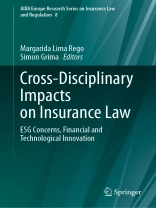This book explores the insurance sector’s potential role, influence, and impact on society in light of new environmental, social, and governance (ESG) concerns. Furthermore, it looks into how financial and technological innovations help reshape insurance regulation and business models. Unlike their predecessors, 21st century insurers have a growing impact on cross-sector service provision by making available to their clients a wealth of expert knowledge and experience in data analytics. The book delves into insurers’ transition from suppliers of products – consisting of risk coverage or investment opportunities – to providers of various services, and ultimately to solution providers by partnering with their clients so as to prevent failure, optimize their clients’ operations and help them excel in their economic sector. Insurance regulations and policies can be affected by various factors, such as changes in the economy, technological advances, and shifting consumer preferences, to name a few. Additionally, the insurance industry can have a significant bearing on the wider economy, making it important for the industry to operate within a framework of comprehensive regulations.
This book includes a diverse set of theoretical, empirical, and policy-oriented chapters on particular aspects of new trends and wider analyses leading to a more systematic understanding of the industry’s socio-economic role. It offers a mixture of chapters from insurance academics and professionals from different countries, cultures, and scientific backgrounds. The methodologies used are diverse, including legal, sociological, historical, economic and financial as well as interdisciplinary analyses. The book has a global scope, including chapters of a more global nature and others addressing particular jurisdictions on different continents, including Europe, Asia and North America.
Inhaltsverzeichnis
Part I – Insurance and ESG Impact.- The Insurance Sector’s Contribution to the Sustainable Development Goals: a Story Worth Telling?.- Insurance is Accelerating Economic and Social Change in the United States: a Legal and Sociological Perspective.- The role of insurance in dealing with disasters: the case of agricultural insurance.- Measurement of the Level of Government Intervention in the Compulsory Health Insurance System: Cross-country Comparative Analysis.- Part II – Financial Innovation in Insurance Regulation.- Historical, Definitional, and Implementional Issues of Financial Services Regulation in a Small Jurisdiction.- Public/ Private Risk Financing Innovation: the Case of Government Self- Insurance Risk Pools in the United States.- Comparison of Efficiency Levels of Turkish Insurance Companies with VZA Malmquist Total Factor Efficiency Analysis.- Unpacking the Impact of Capital Structure on Financial Performance in the Insurance Industry: Evidence from Kosovo’s Market.- Part III –The Impact of New Technologies and Other Recent Developments in Insurance Law and Regulation.- The Principle of Proportionality in Solvency II.- Automatic Vehicles and Legal/Insurance Risks. A New British “Quasi-Legislative” Point of Observation and Glimpses of Liability in Tort in Italy.- A Study of the Effectiveness of the General Data Protection Regulation for Risk Mitigation in the Insurance Industry: a Maltese Perspective.- The Digitalization of the Insurance Industry and the Growth of Life Insurance in India.- Exploring the Suitability of the Protected Cell Company Structure for Shipping Business: a Call for Further Discussion and Research.- Goods and Services Tax Implications on the Insurance Sector: Assessment of Awareness and Knowledge.- The Effectiveness of Recent Policyholder-friendly Laws at Addressing Complaints in India.
Über den Autor
Prof. Margarida Lima Rego is full professor and dean of NOVA School of Law, NOVA University, Lisbon, where she has lectured regularly since 2005. She is the holder of the Jean Monnet Module in EU Insurance Law: Challenges in the SDG Era. Margarida’s main areas of research and practice are civil and commercial law, with a special focus on insurance law. She has been a member of the Board of Appeal of the European Supervisory Authorities since December 2021. Margarida is an active researcher at CEDIS, the School’s R&D Unit, where she founded and coordinates the NOVA Knowledge Centre for Data-Driven Law. Current positions include: President of AIDA Portugal; member of the Executive Committee and Scientific Committee of AIDA Europe; of the Scientific Committee of CILA; and of the Presidential Council of AIDA World.
Prof. Simon Grima is the the Deputy Dean of the Faculty of Economics, Management and Accountancy, and the Head of the Departmentof Insurance and Risk Management. Simon is also a Professor at the University of Latvia, Faculty of Business, Management and Economics and a visiting Professor at UNICATT Milan. Moreover, he is the chairman of the Scientific Education Committee of the Public Risk Management Organization (PRIMO) and the Federation of European Risk Managers (FERMA) and has been awarded outstanding reviewer for Journal of Financial Regulation and Compliance in the 2017 and 2022 Emerald Literati Awards.












